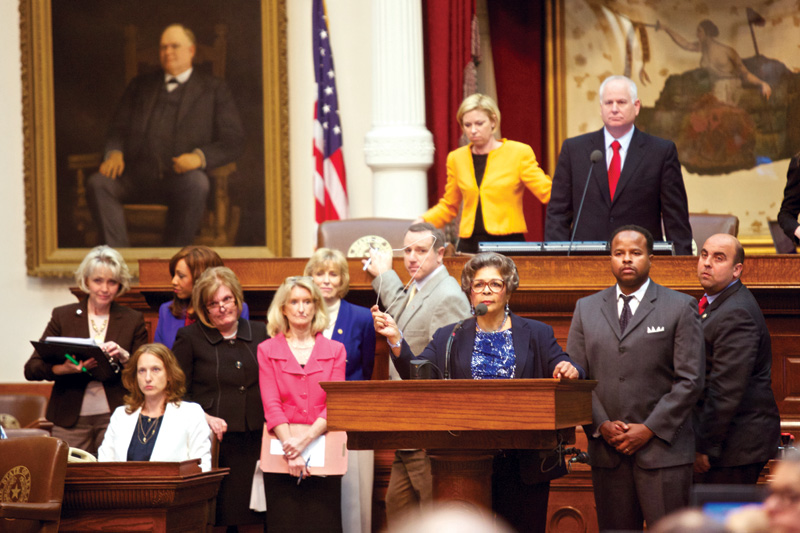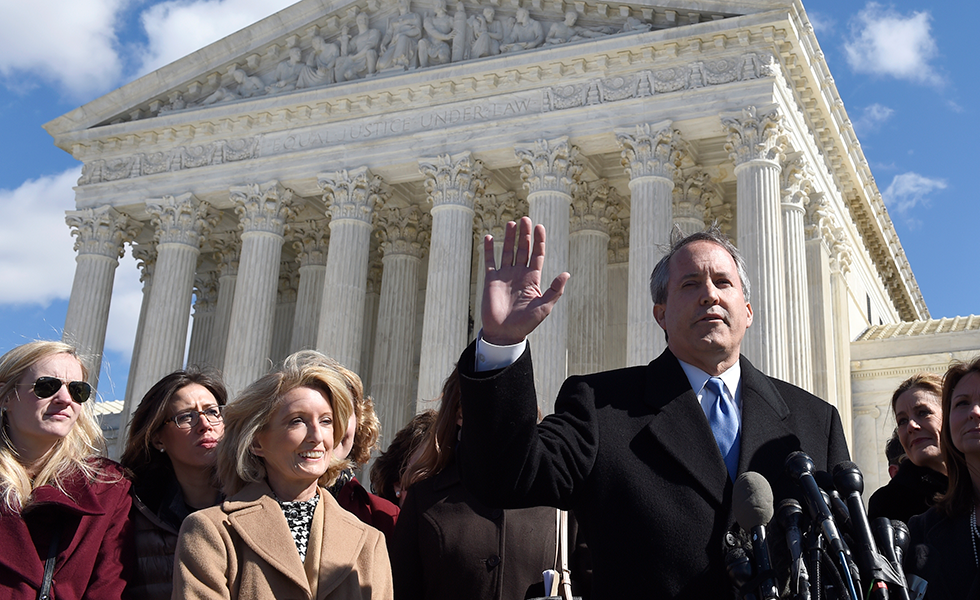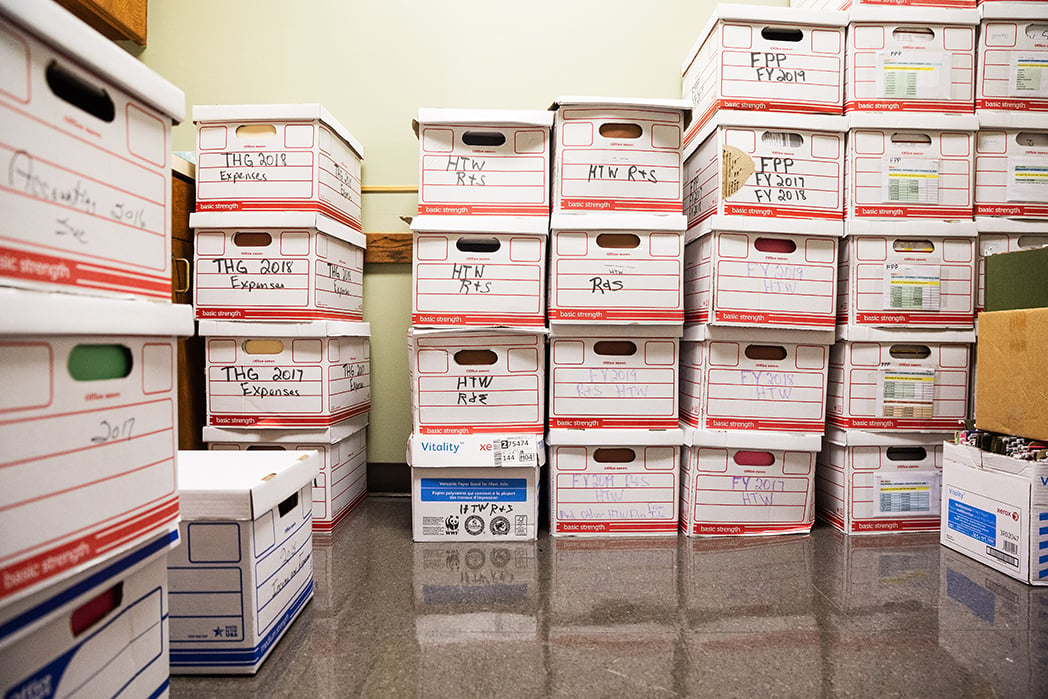
Federal Judge Strikes Down Portions of Contentious Anti-Abortion Law
Above: Rep. Senfronia Thompson displays a hanger during a contentious abortion debate on the House floor in early July. Staff photo.
Update: On Oct. 31, the U.S. Fifth Circuit Court of Appeals overturned Judge Yeakel’s ruling. Read the full story here.
In a last-minute ruling today, a federal judge blocked portions of House Bill 2, the contentious anti-abortion bill—a partial victory for abortion-rights groups. U.S. District Judge Lee Yeakel struck down a provision that would have forced Texas abortion providers to gain admitting privileges to nearby hospitals. But Yeakel allowed most restrictions on medication abortion to go into effect tomorrow. Attorney General Greg Abbott has announced that he will appeal the ruling to the conservative U.S. 5th Circuit Court of Appeals, and the case could end up before the U.S. Supreme Court.
Yeakel ruled that requiring clinics to obtain admitting privileges “places a substantial obstacle in the path of a woman seeking an abortion” and is therefore an unconstitutional “undue burden.” That provision was set to go into effect at midnight.
However, Judge Yeakel also ruled that requiring clinics to follow FDA protocols in administering abortion-inducing drugs, while “clearly more burdensome to a woman,” was not unconstitutional. The FDA protocols call for stronger dosages, an extra in-clinic visit and stipulates a shorter window for getting a medication abortion than standards followed by abortion clinics and widely accepted by the medical community. Yeakel granted an exception for women unable to have surgical abortions for health reasons—a loophole that seemed to confuse a few reporters, leading to a flurry of inaccurate reporting when the ruling was first issued this afternoon.
In a three-day trial last week, a coalition of women’s health advocates, including Planned Parenthood and the ACLU, asked Judge Yeakel to block two provisions of HB 2 that they argued would decrease patient safety and cause up to a third of abortion clinics to close because of the difficulty of obtaining privileges at nearby hospitals. The plaintiffs also argued that the admitting privileges requirement failed to improve the quality of care and was bureaucratically impossible to achieve. The state of Texas argued in its defense that admitting privileges enabled the swift treatment of complications from abortion, which the state argued are both common and under-reported.
But on this issue, the state failed to convince Judge Yeakel, who wrote in his judgment: “The court concludes that whether an abortion provider has admitting privileges does nothing to further the interest of patient care by improving communication. Nor does it impact the timeliness of care in the emergency room, where the nature of practice is to treat patients with all possible haste.”
However, his ruling on medication abortion restrictions was less straightforward. He acknowledged in his judgment that the FDA protocol would impose additional discomfort and inconvenience for women, as well as a higher cost. But because women may also choose to have a surgical abortion at roughly the same cost, Yeakel ruled that the “restrictions on medication abortion do not rise to the level of an undue burden on the right to seek a previability abortion.” He did, however, find that an undue burden would exist for women for whom surgical abortions were not a reasonable alternative because of health reasons. He left it up to the physicians to use their “medical judgement” to decide which of their patients may still have a legal medication abortion under the non-FDA prescribing protocol.
Women’s health advocates found today’s ruling bittersweet. “The court was right to strike the admitting privileges provision. It is unconstitutional and it would have shut down women’s health centers throughout the state,” said Louise Melling, deputy legal director of the American Civil Liberties Union. “We are disappointed by the ruling on the medication abortion restriction, which ignores accepted medical practice and will force providers to use less safe methods. But we will continue to fight and explore every option to protect women’s health.”
A third provision of the bill —a ban on abortion after 20 weeks gestation—was not challenged and goes into effect tomorrow. Fewer than 400 women in Texas choose to have abortions after 20 weeks gestation. They are primarily those for whom their pregnancies pose a severe health risk, or those who only discover a fetal anomaly at the 20-week ultrasound scan.
A fourth provision of the bill—the requirement to upgrade clinic facilities in line with ambulatory surgical care centers—goes into effect in September 2014.
Original story published Oct. 23, 2013 at 2:39 p.m.: Fate of Texas’ Anti-Abortion Law Awaits Judge’s Decision
It was like a reunion in U.S. District Judge Lee Yeakel’s courtroom this week. Abortion-rights activists and opponents, some of whom had spent days at the Capitol this summer to fight, or support, the state’s tough new anti-abortion bill, House Bill 2, regrouped to watch plaintiffs challenge portions of the bill in Austin’s federal court.
You got a sense of the bill’s potential impact—and perhaps its lasting political fallout—from the makeup of the legal teams. The plaintiffs’ lawyers, from Planned Parenthood Federation, the ACLU and the Center for Reproductive Rights, consisted of nine women and one man. The counsel for the defense, representing the state of Texas, comprised one woman and 10 men.
Plaintiffs hope to persuade Judge Yeakel to block two provisions of HB 2: the requirement that abortion doctors obtain admitting privileges to hospitals within 30 miles of the abortion clinic, and restrictions on medication abortions. HB 2 requires that providers follow the FDA protocol for medication abortions, which mandates an extra patient visit and a stronger dosage than what physicians currently use.
Judge Yeakel must decide whether HB 2 represents an unconstitutional intrusion on a woman’s right to access abortion, or whether it constitutes a state interest in protecting fetal life. If Yeakel sides with the state, 13 abortion clinics could close as soon as Tuesday, and thousands of Texas women could lose access to women’s health services, including safe, legal abortions.
The plaintiffs brought five witnesses to the stand—three abortion providers, one ER doctor and one academic researcher—who testified that the effect of HB 2 would be to make abortion less accessible and less safe. The witnesses testified that the off-label use of medication abortion drugs, rather than the FDA-approved dosage, is not only clinically appropriate but in some respects safer for patients. They also emphasized that complications from medication abortions are rare and that the requirement to have an extra clinic visit is unduly burdensome for patients, especially those traveling from afar.
During cross-examination of the plaintiffs’ witnesses, attorneys for the defense focused on a number of disparate issues centering on the prevalence of complications and how they report. They focused on specific patients’ complications, clerical errors in the patients’ files and the proportion of women who currently opt for medication abortions (26 percent, according to state records). John Scott, the lead defense attorney, repeatedly stumbled over his pronunciation of mifepristone and misoprostol, the two drugs central to the case under litigation. The overall purpose of the questions posed in cross-examination was never clear.
Witnesses also discussed the difficulty in, and futility of, abortion doctors obtaining admitting privileges at hospitals. Andrea Ferrigno of Whole Woman’s Health is responsible for securing admitting privileges for the 11 abortion physicians operating at her abortion clinics in Austin, San Antonio, Beaumont, McAllen and Fort Worth. She described the lengthy bureaucratic process involved in applying for privileges. Methodist Healthcare System in San Antonio, for example, requires that doctors be local residents, yet the physicians working at the Whole Woman’s Health clinic in San Antonio live in Austin, Houston and Rhode Island. Ferrigno stated that she had approached 32 hospitals for admitting privileges. But only 15 even offered a way to submit an application. To date, no hospitals have given any indication when or whether privileges will be granted.
Amy Hagstrom Miller, CEO of Whole Woman’s Health, also testified. She said that three of her five clinics would close on Oct. 29 because of their inability to obtain admitting privileges for their physicians. She said that she knew of another 10 that would likely close across the state.
Professor Joseph Potter of the University of Texas at Austin testified that 22,000 women would lose access to abortion services as a result of the admitting privileges requirement. In cross-examination, the lawyers for the state spent their time trying to discredit the validity of Potter’s research. In particular, they criticized Potter for refusing to disclose the names of the clinics he had surveyed. However, Potter argued that it’s standard academic protocol to not reveal survey respondents.
Another witness for the abortion-rights coalition, Jennifer Carnell, an emergency physician at Ben Taub General Hospital in Houston, testified that patients coming into an emergency room with abortion complications do not receive faster or quicker care if their abortion physicians have admitting privileges. But defense counsel John Scott twice asked Carnell whether patients would receive worse care if their abortion doctor had admitting privileges. She said that they would not.
”The burdens imposed by the admitting privilege requirement could not be more stark,” said Janet Crepps, lead counsel for the plaintiffs in her closing arguments on Wednesday. Because of the difficulty obtaining admitting privileges she said, one third of health centers from Lubbock to McAllen will stop providing abortions next Tuesday. Moreover, the restrictions on medication abortions, she argued, will actively harm women by turning the clock on medical practice back 20 years.
In his closing arguments, Deputy Solicitor General Andrew Oldham dismissed Crepps’ arguments about patient safety, contending that constitutional precedent granted the state a greater interest in protecting fetal life. Judge Yeakel asked Oldham whether the admitting privilege requirement applied to any other medical treatment. Oldham said that he didn’t know but legally it didn’t matter because abortion is held by the courts to be unique from other medical procedures. In her rebuttal, Crepps argued that the defendants had failed to identify any connection between the two HB 2 provisions and fetal life protection.
Likewise, Oldham argued that plaintiffs had failed to prove that abortion clinics will close on Tuesday or that the third clinic visit required by the FDA protocol was burdensome.
Crepps replied: “Short of calling these witnesses dishonest, I don’t know what the state can expect for further proof. Does the state want to wait for the disastrous consequences of all these providers shutting their doors before we can obtain constitutional relief?”
“I recognize that the clock is ticking toward October 29th,” said Judge Yeakel in his closing comments. He is expected to issue his decision before Tuesday. However, Yeakel is unlikely to have the last say. His decision will almost certainly be appealed to the conservative Fifth Circuit U.S. Court of Appeals.


